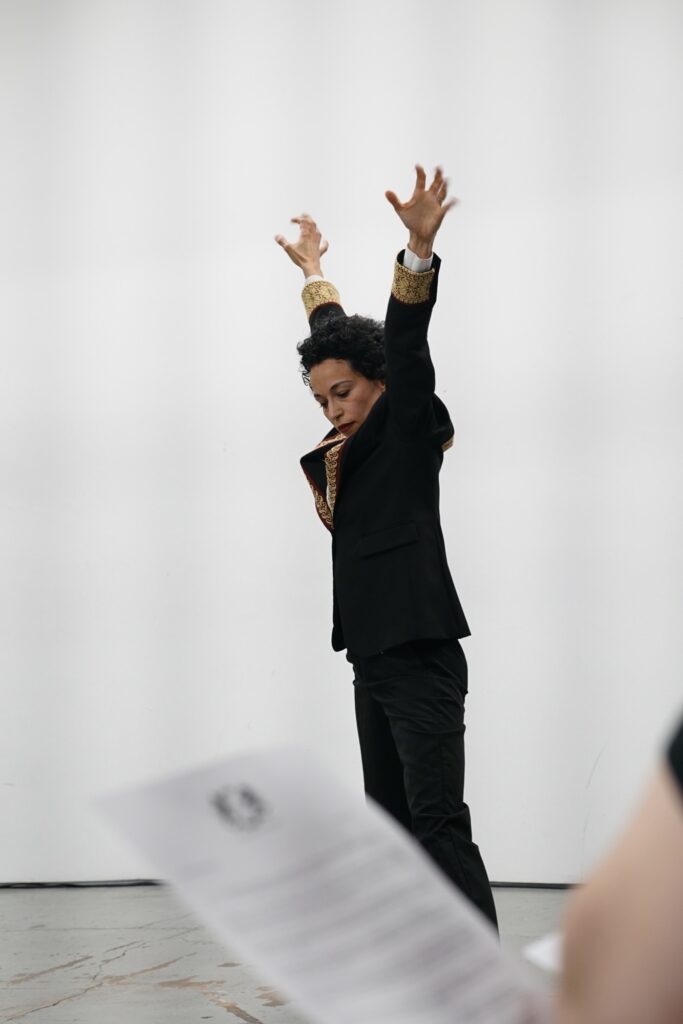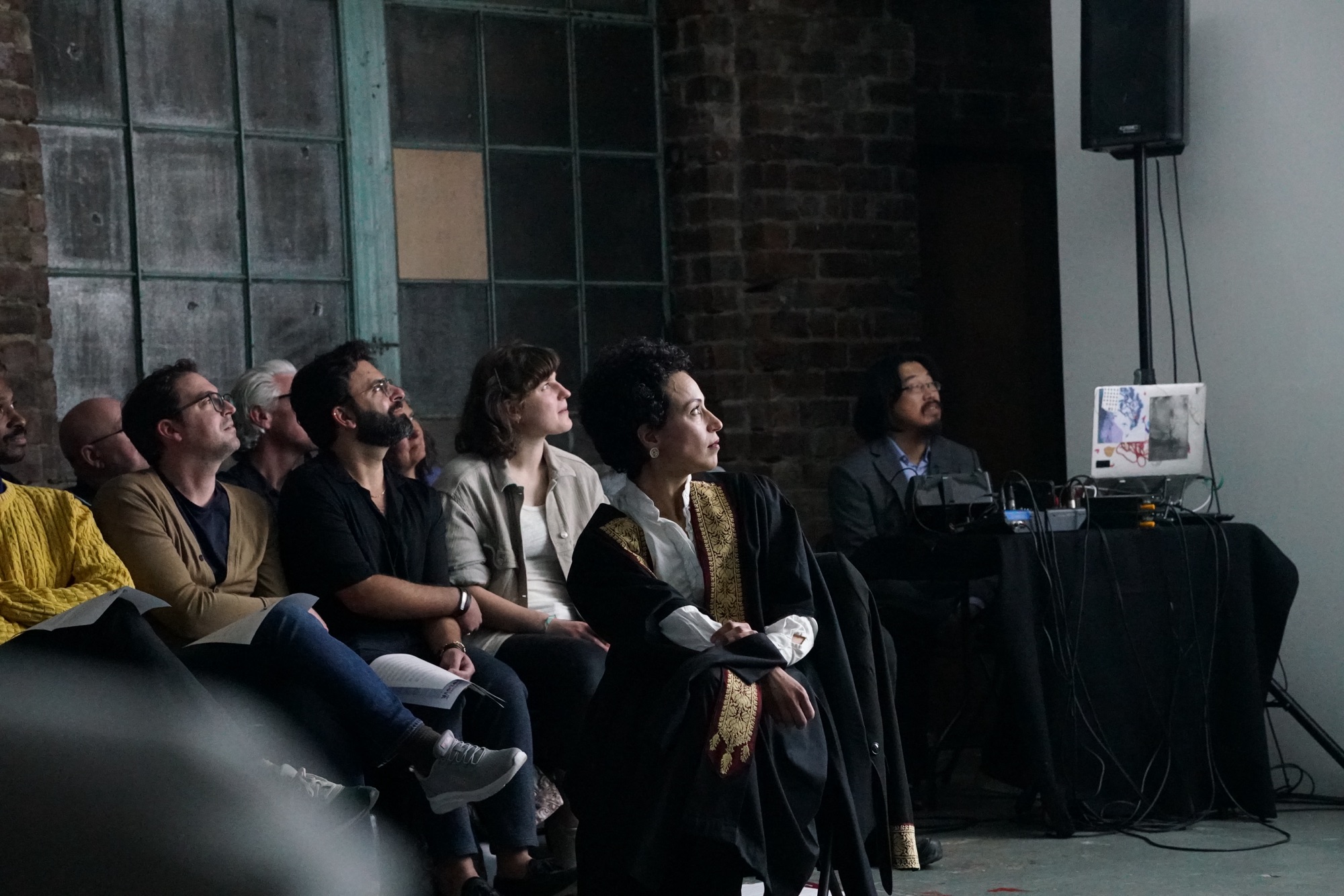Balfour Reparations is a performance lecture by Farah Saleh that examines the UK’s colonial legacy in Palestine, focusing on Arthur James Balfour, Prime Minister (1902-1905) and Foreign Secretary (1916-1919), and his role in denying Palestinian political rights.
Utilising Speculative Choreography and Afrofuturism, the work intertwines history, fiction, and fantasy, drawing inspiration from archival materials.
Set in 2045, the lecture reflects on a fictive apology letter issued by the UK in 2025, promising reparations to the Palestinian people. The audience become members of the reparations’ evaluation committee created on the 20th anniversary of the apology and are invited to participate in the performance.
We sat down with Farah to find out more about the work.
Q: Thanks for chatting with us Farah! Tell us about yourself and the work you’re presenting at Made in Scotland.
Farah: I have an ongoing long-term project called the Archive of Gestures in which I unearth hidden Palestinian narratives through the body. I deal with the body as an archive, while also working with physical archive materials like sound, pictures, documents, etc. Most if not all of this is not in official archives, but more family archives and the like. The most recent work in this project is Balfour Reparations, which I will present at the 2025 Made in Scotland Showcase.
Balfour Reparations is a participatory performance lecture that confronts the colonial legacy of the UK and Palestine. Most closely it looks at the Scotsman Arthur James Balfour who was an academic and a politician. When he was Foreign Minister in 1917, he wrote a declaration promising Palestine as a home for the Jewish people, while denying all political rights for the Palestinians. Palestinians haven’t had self-determination since this declaration in 1917.
The performance is participatory, taking place in 2045. In the performance we reflect with the audience members on a fictive apology letter that was written in 2025 by the UK Government to the Palestinian people, promising them reparations.
I ask the audience members to read this letter a couple of times, whoever wants to volunteer themselves. At a certain point, I ask them to give further reparations beyond 2045. This is so that hopefully their thoughts and actions continue after the performance ends. The whole performance lecture is a call for action that starts in the performance, then hopefully continues after.

Q: Who are you collaborating with? (Give them a shout-out!)
Farah: I started by collaborating with Lucas Chih-Peng Kao, who is a filmmaker, working mostly with his sound skills. In the performance, we create the video together, and he live mixes the sound and peoples’ voices.
The collaboration started with Lucas, and then it expanded because we began in Autumn 2023 at the beginning of the Genocide – almost two years ago. We work with Creative Producer Helen McIntosh, and a great team of collaborators.
Q: Why is it important to have festivals and platforms like Made in Scotland in the current climate, especially a festival spotlighting Scottish artists and dancers.
Farah: I think in a moment where nationalism is growing and right-wing parties and governments all around Europe and the world are calling for isolationism, it is important to still have connections with other countries to ensure Scottish art – Scottish dance in this instance – so we keep that exchange.
It’s the form, but also the content, the exchange between artists, festivals and audiences. I think that’s very important because otherwise we will really get isolated. Nationalists just want to keep people closed and close their minds, so I think it’s really important to have this openness.
Q: How does it feel to take your work (whether it’s a new or ‘old’ work!) to this festival?
Farah: I’m excited to perform in Summerhall because it’s a political venue and they’ve hosted Palestinian artists before so hopefully, it will be well received.
It might be surprising, because up until now, the organisers of each performance or festival where we have performed have had their own audiences: mostly academics, artists and activists.
At the Fringe, you don’t know who will show up. It might be a different vibe, let’s see! That’s exciting because it might all be a surprise.
Q: What do you hope the dancers in the work and audience watching will experience?
Farah: The audience will not ‘watch the work’, they will take part and experience it and hold it with me. It doesn’t work without them. In this way it will be an embodied experience of action with spoken word and movement.
Movement doesn’t mean dance, it means daily gestures and social choreography so for me, audiences will hopefully bring this action in which they participated outside of the theatre space and continue acting towards the attainable action points that the letter that is central in the performance offers them.
Balfour Reparations by Farah Saleh is presented at TechCube0, Summerhall from Wednesday 13 August – Monday 25 August (not 19), 16:30 – 17:30, as part of the Made in Scotland Showcase, visit here to book.
